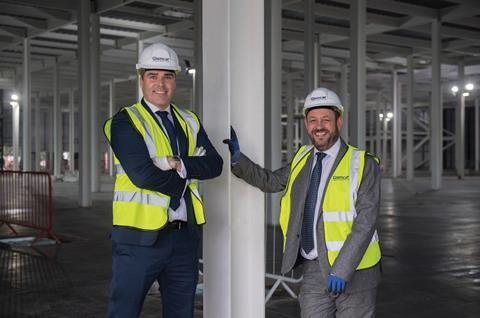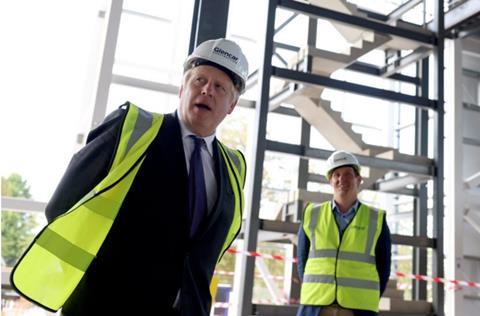Eddie McGillycuddy and Chris Gleave tell Dave Rogers how the firm they set up six years ago is branching out and why clients now want ‘sheds’ to look pretty

If anyone has driven up the M1 recently, they cannot fail to have noticed the sight of cherry pickers and steel frames popping up alongside the main route out of London to the Midlands and beyond.
For those in the know, the sheer amount of plant, steel and cladding that peppers the stretch of motorway north of Luton and before the turn-off for the M6 means only one thing: distribution warehouses.
And the chances are that, where there is a cluster of industrial buildings going up – sometimes known by the slightly dismissive shorthand of “sheds” – Glencar will be involved.
If there has been one benefit of Brexit, then, says the firm’s chief executive Eddie McGillycuddy, it is the explosion in the number of distribution centres and warehouses that are used to stock everything from clothes to food to medicines. “It used to be about just-in-time delivery, now it’s just in case,” the Irish-born north Londoner says.
According to the Office for National Statistics, the warehouse and logistics industry was worth £5.59bn last year, the highest figure since it started measuring the sector’s value in 1985.
Underlining the boom, driven by the explosion of online shopping during the lockdowns of 2020 and 2021, was the 150% leap in value on the £2.29bn recorded in 2020.
Based in St Albans, Glencar, which takes its name from the County Kerry village where McGillycuddy was born, has been in the thick of this boom.
>> Also read: Glencar opens Manchester office as demand for warehouse space soars
>> Also read: Building Awards 2020: contractor of the year up to £300m
McGillycuddy says the current demand for industrial and logistics – “I and L” as he calls it – began with Brexit.
“People store a lot more onshore now, they manufacture more onshore. People are scared of borders: will stuff get in? am I going to be taxed more? The demand [for space] is significant.”
A father of four, he has seen the growth of online shopping first-hand with deliveries to his Hertfordshire home, especially since the pandemic. “We get boxes and boxes of stuff every day,” he sighs.
Glencar was set up six years ago when McGillycuddy and fellow director Chris Gleave left McLaren after racking up 26 years at that business between them.
“We left on good terms,” says McGillycuddy, whose father Pat, now Glencar’s chairman, helped to set up logistics firm Gazeley and was in charge for 30 years before it was bought by Singapore investor GLP five years ago.
McGillycuddy says he had an idea for a business opportunity but there was insufficient space to grow it at McLaren. “I’d always wanted to set up my own business. I approached Chris and asked if he wanted to come with me. I said, ‘This is what it’ll be called, this is how we’ll do it’.
“We resigned together. We worked out a six-month notice and, at the start, it was just the two of us.”

The pair were retained by McLaren to close out contracts. “We were ramping up Glencar while getting paid by McLaren. It was all done on good terms and the customers we knew at McLaren – like Access Self Storage and Ocado – we still work for.”
Now with a workforce of 350 people, the niche that McGillycuddy had spotted was small-value contracts for warehousing space, the range between £5m and £10m in an area where jobs can be much more than that.
Its typical job is around £12m but its largest to date is a £135m vaccines manufacturing and innovations centre for the government at the Harwell Science Campus in Oxfordshire. It was deemed so important that then prime minister Boris Johnson paid a visit in September 2020 to see how construction was faring.
“I don’t see demand drying up,” says McGillycuddy, pointing out that commercial developers such as British Land, better known for their retail and office developments, are repositioning to get more of the logistics market while Slough Estates, now known as Segro, is working with Berkeley Homes subsidiary St George on a multi-storey distribution hub, the first of its kind, at Park Royal near the Ace Café – a well-known hangout for bikers – on the North Circular Road in north-west London.
He says warehousing is now less about the large space, known in the game as customer fulfillment centres which would typically be around 600,000sq ft, and more about the smaller sites, the last-mile hubs of possibly no more than 20,000sq ft from where stock is sent for same-day delivery.
McGillycuddy sees more demand for last-mile logistics – storage space built in the middle of towns and cities for products then dispatched to locations within a few miles – and more multi-storey space given that the warehouses springing up beside places like the M1 are being built on green-belt land.
Where people were borrowing to fund, they’re not getting that funding at the moment. It was practically free, but now it’s not
Eddie McGillycuddy, founder and CEO, Glencar Construction
The concept of “beds on sheds” – where residential is put on top of distribution centres – is also being looked at, although worries persist about noise levels given the 24-hour nature of the hubs.
But, at some stage, the country’s rampant demand for storage space will ease and, to this end, Glencar is looking into other sectors such as data centres. The firm is currently bidding for three – two in the South and one in the Midlands.
“It’s a growth sector,” says McGillycuddy. “There is a lot of demand [for data centres’ services] but the infrastructure isn’t there. There needs to be more in the South and London. A lot of housing is being delayed because of a lack of power.”
McGillycuddy and Gleave worked on data centres while at McLaren but the area is new to Glencar, where its rivals include familiar names such as ISG and Mace as well specialists such as Irish firms John Paul Construction and Mercury Engineering.
“On a data centre, you need to partner with an M&E firm,” says McGillycuddy. “They tend to be smaller than a warehouse for a company like, say, Amazon but the fundamentals are the same. It has a steel frame, construction is around 12 months and then there is the fitting out.”
Life sciences, too, are another area that Glencar is looking at and it considered the Merck building job, which will see an Access self-storage unit opposite King’s Cross station in London turned into a 10-storey healthcare complex designed by AHMM, but the firm decided the scheme, which has an overall cost of around £300m, was too big.
With offices across the Irish Sea in Dublin and Kerry, it is also looking at work in Ireland, including a handful of logistics jobs around the Dublin area.
In its last set of filed accounts, Glencar posted a turnover of £160m, but this year the figure is expected to have jumped to £417m by the time it files its accounts in the next few weeks. Next year it is expecting income to be between £550m and £600m. Workloads, then, seem to be holding up although, at first glance, margins appear wafer-thin.

The firm is expecting to post a £700,000 pre-tax profit this year but says its bottom line has been squeezed by investment in new staff and IT, as well as being caught out by several fixed-price jobs, agreed last summer, which saw their budgets blown as the cost of materials including concrete, rebar and cladding skyrocketed earlier this year.
Several subcontractors also went under, which saw Glencar having to pick up the pieces. But it is aiming for margins of 1% to 2% in the current financial year and 2% and over in the following 12 months. McGillycuddy points out that the firm is also cash-rich enough to make a £1,000 cost-of-living payment to staff this month.
But he cautions that the affordability of schemes might become more difficult in the coming year as the cost of borrowing money goes up – pointing out that US investors appear the most likely to sit on their hands. “Where people were borrowing to fund, they’re not getting that funding at the moment,” he says.
“It was practically free but now it’s not. Those that have money will carry on developing – that’s what we’re hearing.”
We used to call them crinkly tins but the one at Park Royal looks like a central London office block. It’s got 23 different facade treatments. They can’t just be big, square boxes anymore
Chris Gleave, founder and director, Glencar Construction
McGillycuddy says that next year some projects might take longer to get going and planning remains an issue. Gleave adds: “It is a big sticking point and, in the past year it has got worse. Planning departments are under-resourced and can’t cope with so much demand.”
Glencar says it has an eye on workloads for 2024 and says sectors such as data centres and life sciences are more recession-proof. “Borrowing money is going to cost more and those sectors are more resilient,” McGillycuddy says.
The firm has also moved into film studios, which is a sector benefiting from tax relief. Its current jobs include work for Soho Studios and Ealing Studios.
But, like many, McGillycuddy and Gleave have worries about who will do all this. While Brexit has helped to create a boom in storage space, so it has squeezed labour, with many firms finding that workers went back home, especially to eastern Europe.
“There are struggles with roofers and cladders. A lot of the dry liners have not returned,” Gleave says.
Glencar’s average payment time is 35 days and McGillycuddy says some firms have requested that they be put on two-week payment runs. “If they need help, we will do that and also if they’re a long-term supply chain partner. If they need cash in the bank to buy materials, then fine. We would not get repeat business if our supply chain was not performing.”
While industrial and logistics is seeing more two-stage bids, the majority of procurement is still single-stage. “It’s quite competitive,” concedes Gleave. “There are still guys who will cut their own throats to win a job.
“Five years ago, it was all single-stage but I think clients are realising that to lock in delivery you need two-stage.”
Clients are also realising that the warehouses need to look less like, well, sheds in order to attract people to work there. Chetwoods has designed a warehouse and office scheme at Nuneaton near the M6 in Warwickshire that developer Baytree says will include “exercise equipment, edible landscapes, outdoor recreation places and reindeer moss walls”.
Gleave adds: “We used to call them crinkly tins but the one at Park Royal [designed by Michael Sparks Architects] looks like a central London office block. It’s got 23 different facade treatments. They can’t just be big, square boxes anymore.”

Eddie McGillycuddy CV
Aged 42, McGillycuddy (pictured right) was born in the County Kerry village of Glencar, from where the firm takes its name, before his parents relocated to Harrow in north-west London when he was aged three.
1998-2002 Construction management degree at Liverpool John Moores University.
2002-16 Joined McLaren as an assistant engineer, becoming a divisional director in charge of a turnover of around £150m.
2016-22 Left to set up Glencar Construction with Chris Gleave.
2022- Became chief executive of Glencar, which is expected to post a turnover of £417m in its next set of accounts and employs 350 people. The firm is looking at income of £550m next year and staff numbers of close to 400 people.
Chris Gleave CV
Aged 51 from Edmonton, north London.
1989-96 Joined Taylor Woodrow Construction as a trainee quantity surveyor.
1996-2004 Progressed through the ranks at Jarvis, based in Harpenden, Hertfordhire, becoming a managing quantity surveyor in 2002.
2005-16 After spending a year with a developer, joined McLaren Construction. Promoted to commercial director in 2009 and responsible for the southern region’s commercial activities and a turnover in excess of £120m.
2016- Left McLaren to set up Glencar Construction with Eddie McGillycuddy. Now company director.



























No comments yet